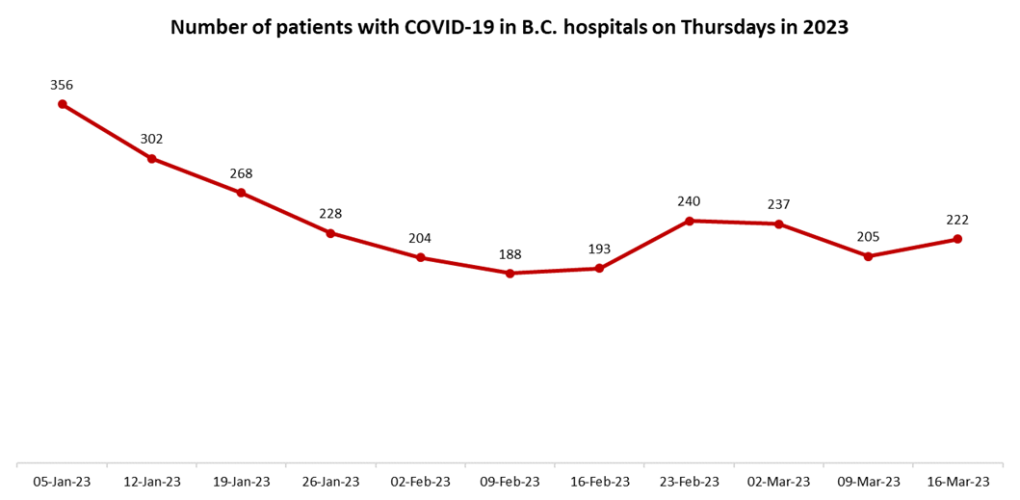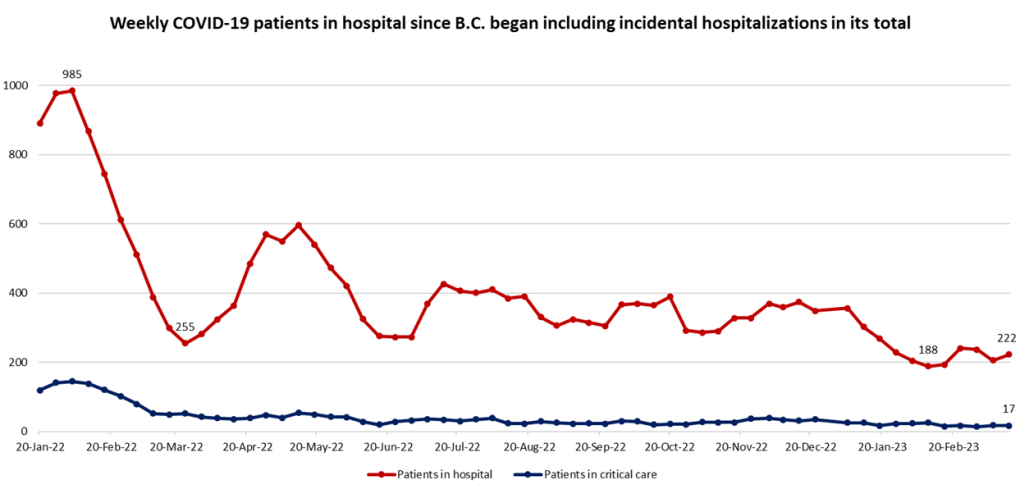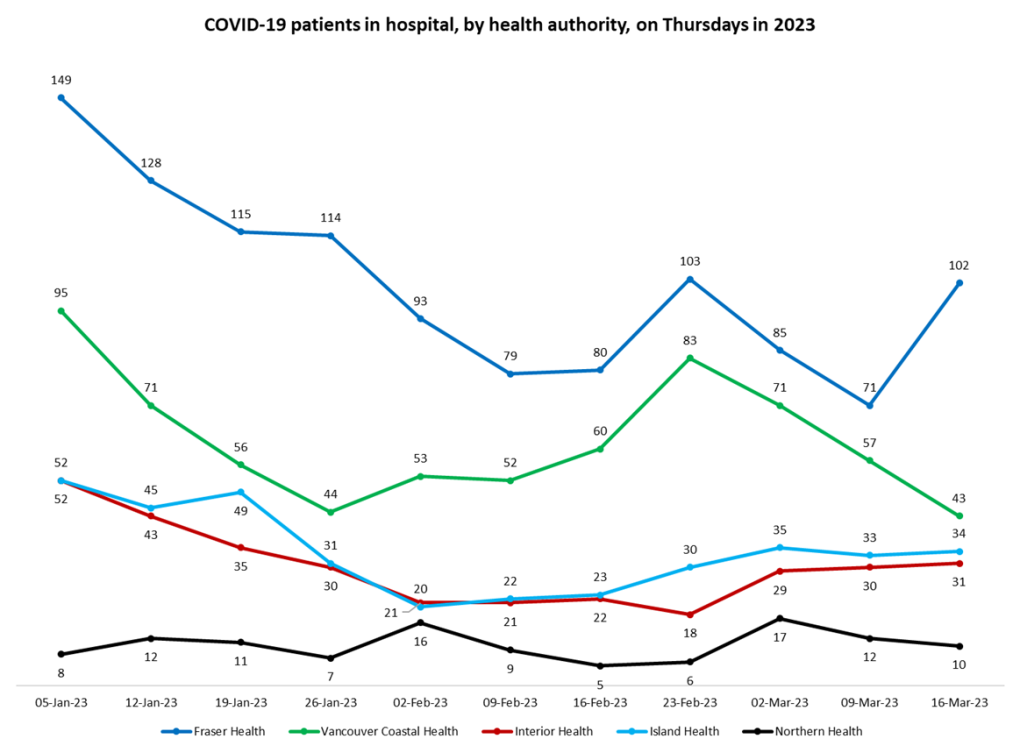COVID-19 hospitalizations rise in latest B.C. update, led by Fraser Health
 Courtesy: Shutterstock.
Courtesy: Shutterstock.
The B.C. Centre for Disease Control reported 222 people in hospital with COVID-19 Thursday, a modest increase from the 205 seen last week.
The increase reverses a declining trend that had been in place for the previous two weeks, but reflects the latest data showing increased cases, wastewater virus concentrations and new hospital admissions.
 The number of people in B.C. hospitals with COVID-19 on Thursdays in 2023 is shown. (CTV)
The number of people in B.C. hospitals with COVID-19 on Thursdays in 2023 is shown. (CTV)
The number of people in hospital reported each week by the BCCDC includes both those who are hospitalized because of serious cases of COVID-19 and those who are admitted for other reasons and test positive incidentally.
Health officials estimate that between 40 and 50 per cent of people in hospital with COVID-19 at a given time are there because of the disease, while the rest are incidental cases.
Before January 2022, the BCCDC reported hospitalization totals that sought to exclude incidental cases. Since switching to the current model – known as "hospital census" – the centre has reported as many as 985 people in hospital with COVID-19 on a Thursday and as few as 188.
This week's total of 222 is still below the lowest total seen at any point in 2022, which was 255.
 The number of people in hospital with COVID-19 in B.C. on Thursdays since the province switched to a "hospital census" model in January 2022 is shown. (CTV)
The number of people in hospital with COVID-19 in B.C. on Thursdays since the province switched to a "hospital census" model in January 2022 is shown. (CTV)
Notably, the increase in the hospital census this week is driven entirely by a surge in the Fraser Health region, which – at 102 people in hospital with the coronavirus – accounts for almost half of the provincial total.
As B.C.'s largest regional health authority by population, Fraser Health almost always has the largest share of COVID-19 hospitalizations, but its increase this week from 71 people hospitalized to 102 stands in contrast to a continued decline in neighbouring Vancouver Coastal Health.
VCH, which is B.C.'s second-most-populous health authority, had just 43 COVID-19 patients in its hospitals as of Thursday, the lowest total it has seen all year.
 The number of people hospitalized with COVID-19 by region in B.C. on Thursdays in 2023 is shown. (CTV)
The number of people hospitalized with COVID-19 by region in B.C. on Thursdays in 2023 is shown. (CTV)
OTHER DATA
In last week's COVID-19 update, most of the available BCCDC data suggested declining transmission of the coronavirus. The official case count was down, as was the number of new hospital admissions, relative to the preceding week.
Wastewater surveillance data, which the BCCDC publishes later in the day on Thursdays, was the outlier. It showed substantial jumps in concentrations of the SARS-CoV-2 virus at all of the monitored treatment plans in the province.
This week, other measures have caught up to the wastewater data.
The BCCDC reported 374 new, lab-confirmed cases of COVID-19 Thursday, for the period of March 5 to 11, the most recent "epidemiological week."
That total represents an increase from the previous epidemiological week's total, when 347 new cases were confirmed.
Caseloads reported by the BCCDC do not – and cannot – capture every COVID-19 infection that occurs in the province. The official case count excludes reinfections, and only includes cases confirmed through lab-based testing, which is not available to the vast majority of B.C. residents under the province's current testing strategy.
Still, the trend in the official case count has tended to match the trends in wastewater surveillance and new hospital admissions, providing an indication of increasing transmission when it rises and decreasing transmission when it falls.
This week, the BCCDC reported 102 people newly admitted to hospital with COVID-19 from March 5 to 11. That number is subject to change as data becomes more complete, and officials typically revise it upwards in the following week's update.
Last week, the BCCDC initially reported 79 new hospitalizations for the period of Feb. 26 to March 4. That total has since been revised up to 108.
This week's higher reported starting point for new hospitalizations suggests higher rates of infection in the community in recent weeks.
CTVNews.ca Top Stories

'He is no hero': Pennsylvania authorities announce charges against Luigi Mangione
Following his arrest in Altoona, Pa. earlier on Monday, Luigi Mangione was arraigned and charged with five counts, according to a criminal complaint.
Union dropped wage demand to 19% over four years in Canada Post negotiations: CUPW
The Canadian Union of Postal Workers (CUPW) has reportedly dropped its wage demand to 19 per cent over four years, CUPW negotiator Jim Gallant told CTV News.
Taxpayer-funded Eras Tour tickets returned by federal minister
While tens of thousands of fans packed Vancouver's BC Place for the last shows of Taylor Swift's Eras Tour this weekend, a federal cabinet minister wasn't one of them.
Sudbury, Ont., family traumatized after hospital said loved one had been released, when in fact they had passed away
Sudbury resident Angela Vitiello says a staff member at Health Sciences North told her that her brother, Allan St. Martin, was released from the hospital late last month when, in fact, he had passed away.
What the upcoming holiday GST relief will mean for consumers
The federal government's GST break will arrive this Saturday, just in time for the last stretch of holiday shopping.
Liberal government survives third Conservative non-confidence vote
Conservative Leader Pierre Poilievre's latest attempt to topple the minority Liberal government in a non-confidence vote failed on Monday, thanks to the New Democrats.
Katie Holmes refutes story about daughter Suri Cruise’s fortune
Katie Holmes has posted a screen grab of a Daily Mail article, which reported that her 18-year old daughter, whose father is Tom Cruise, is now a "millionaire."
Polygamous U.S. sect leader gets 50 years in prison in scheme to orchestrate sex involving children
A polygamist religious leader in the U.S. who claimed more than 20 spiritual “wives” including 10 underage girls was sentenced to 50 years in prison on Monday.
Trudeau says dealing with Trump will be 'a little more challenging' than last time
Prime Minister Justin Trudeau said dealing with incoming president Donald Trump and his thundering on trade will be 'a little more challenging' than the last time.

































